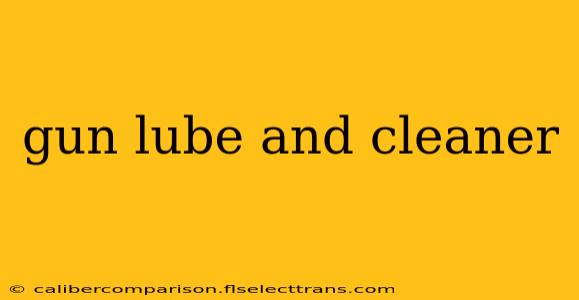Maintaining your firearm is crucial for its longevity, accuracy, and, most importantly, safe operation. This involves regular cleaning and lubrication, and choosing the right gun lube and cleaner is a vital part of that process. This comprehensive guide will explore the different types of gun cleaners and lubricants available, how to choose the best ones for your needs, and best practices for cleaning and lubricating your firearms.
Understanding the Importance of Gun Cleaning and Lubrication
Regular cleaning removes residue from gunpowder, lead, and other contaminants that can accumulate within the firearm's mechanism. These residues can cause malfunctions, corrosion, and even damage to sensitive components. Lubrication, on the other hand, reduces friction between moving parts, ensuring smooth operation and extending the lifespan of your firearm. Neglecting either cleaning or lubrication can lead to significant problems.
The Role of Gun Cleaners
Gun cleaners are formulated to dissolve and remove these stubborn residues. They come in various forms, including:
-
Solvent-based cleaners: These are the most effective at dissolving fouling and are typically preferred for thorough cleaning after shooting. However, some solvents can be harsh and require careful handling.
-
Non-Solvent cleaners: These are gentler options, often utilizing biodegradable solutions and are preferred for less intensive cleaning or for those seeking a more environmentally friendly approach.
-
Bore cleaners: Specialized for cleaning the firearm's barrel, these cleaners are designed to remove lead, copper, and other metallic fouling that can significantly impact accuracy.
Choosing the Right Gun Lube
Gun lubricants are designed to withstand extreme conditions, including heat, cold, and pressure. Their purpose is to minimize friction and wear on moving parts, preventing premature wear and tear. Types of gun lubricants include:
-
Oil-based lubricants: These are generally preferred for their versatility and ability to protect against corrosion. They offer good lubrication and are suitable for most firearms.
-
Grease-based lubricants: These are thicker and offer superior protection against wear and corrosion in high-stress applications. They are less commonly used than oil-based lubricants for general maintenance.
-
Synthetic lubricants: These are often formulated for extreme temperature ranges and offer superior performance in harsh conditions. They are typically more expensive than conventional lubricants.
Factors to Consider When Selecting Gun Lube and Cleaner
Several factors should be considered when choosing gun lube and cleaner:
-
Type of firearm: Different firearms may have different cleaning and lubrication requirements. Consult your firearm's manual for specific recommendations.
-
Caliber: Larger calibers often produce more fouling, requiring more rigorous cleaning.
-
Shooting conditions: Conditions like extreme temperatures or high humidity can influence the choice of lubricant.
-
Personal preference: Some shooters prefer certain brands or types of cleaner and lubricant based on their experience and preference.
Cleaning and Lubrication Best Practices
Always follow these steps for safe and effective cleaning and lubrication:
-
Safety First: Unload the firearm completely and verify it's unloaded before commencing any cleaning or lubrication.
-
Disassembly: Disassemble your firearm according to the manufacturer's instructions. Avoid excessive disassembly unless you are experienced and have the appropriate tools.
-
Cleaning: Apply the gun cleaner to the appropriate parts, focusing on areas where fouling is likely to accumulate. Use a bore brush to thoroughly clean the barrel.
-
Drying: Thoroughly dry all parts before applying lubricant. Use a clean, lint-free cloth to wipe away excess cleaner and residue.
-
Lubrication: Apply a small amount of lubricant to the appropriate points of friction. Avoid over-lubrication, as this can attract dirt and debris.
-
Reassembly: Reassemble your firearm carefully, following the manufacturer's instructions.
Conclusion: Maintaining Your Investment
Regular cleaning and lubrication are essential for maintaining the performance, reliability, and safety of your firearm. By choosing the right gun lube and cleaner and following best practices, you can ensure your firearm remains in optimal condition for years to come. Remember to always consult your firearm's manual for specific recommendations and prioritize safety throughout the entire process.

